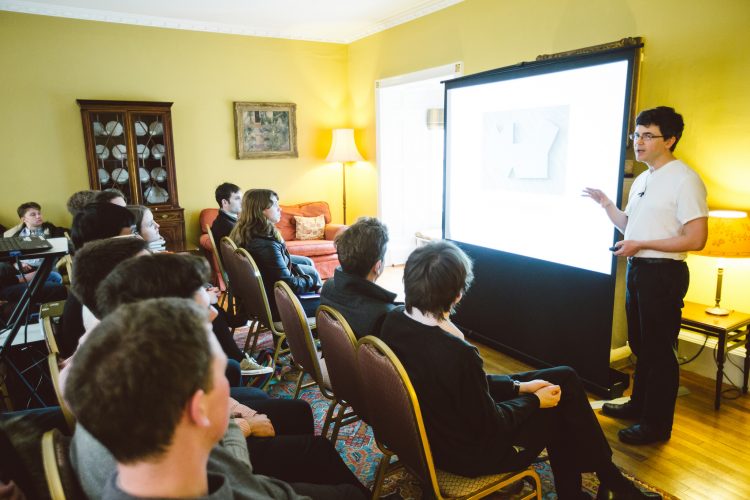Mathematics
undergraduates
Mathematics at university level involves (a) studying the theory, and (b) solving problems; you cannot be a good mathematician without mastering both of these skills. At Oxford, we will encourage you to ask questions and find the solutions for yourself. But in order to do so, you must have a solid grounding in the concepts and the methods. In one sense, you will ‘start from the beginning’. We will teach you to think mathematically and so will start with careful definitions from which we build the edifice. Above all, Mathematics is a logical subject, so you will need to argue clearly and concisely as you solve problems.
The great thing about maths at Oxford is definitely the variety of options you can choose from. Being able to pick modules from as early as 2nd year means you can follow your interests – and it never gets boring!
Dhaval, Mathematics
Mathematics students at St Edmund Hall are able to read either Mathematics or Mathematics and Statistics.
The community of mathematicians at St Edmund Hall is a particularly close-knit and friendly one. Our students are well supported by the tutors and by each other, as collaborative working is encouraged to increase their understanding of the subject material – and of course to lead to breakthroughs too. Mathematicians at St Edmund Hall also enjoy an annual formal dinner in College.
Our students also benefit from a well-stocked college library for Maths texts, and the University Maths department is only a few minutes away from College on foot or by bike.
The Maths courses are stimulating and enjoyable, and in return for hard work they produce clear-thinking and highly-prized graduates much in demand by prospective employers. This degree prepares students for employment in a wide variety of occupations in the public and private sectors. Graduates often secure jobs as actuarial consultants, teachers, investment analysts, management consultants, auditors and software developers.
The College recognises that course content and teaching methods vary from school to school and considers applications from all candidates, whatever their mathematical training. The Mathematics course at St Edmund Hall shares the same academic requirements as other colleges, as published in the University prospectus. Mathematics at A level (or equivalent) is considered essential for the course, whilst Further Mathematics is highly recommended.
Courses in Mathematics are intellectually demanding, and successful candidates will be able to demonstrate a marked ability and interest in both abstract and technical aspects of the subject. School records and reports will reflect their capabilities and continuing commitment.
All candidates for Mathematics (including Joint Schools) will be required to sit the Mathematics Admissions Test (MAT) when applying. For more information on this test, please visit the University website.
In 1999 Christopher Monckton launched a new type of puzzle, similar to a jigsaw but with 209 plain green plastic pieces with geometric shapes. To attract interest, and increase sales, he offered a £1,000,000 prize for the first solution if found within a time limit of a few years. Professor Oliver Riordan here describes some of the ideas Alex Selby and he developed to work on this puzzle, and explains (briefly!) how mathematicians think about such things. He also outlines where the inventor, who expected the puzzle to be much too hard to be solved, went wrong.
This is one of a series of Teddy Talks recorded at St Edmund Hall’s Research Expo in 2015. Teddy Talks are short presentations (usually around 12 minutes long) by St Edmund Hall academics and postgraduate students about an aspect of their research, aimed at a non-specialist audience.
Our Tutors

Oliver
Riordan
Professor of Discrete Mathematics and Tutor in Mathematics
Professor Oliver Riordan joined the College in October 2007 as a Tutorial Fellow in Mathematics, on his appointment as Professor of Discrete Mathematics in Oxford’s Mathematical Institute. Oliver’s research interests have varied with time, but the main focus is and always has been discrete structures, in particular “graphs”, i.e. mathematical models of networks.

Luc
Nguyen
Tutorial Fellow in Mathematics
Professor Luc Nguyen has been at Teddy Hall since October 2013. His research interests are geometric partial differential equations, particularly those arising in general relativity, geometric analysis and liquid crystals.

Tom
Crawford
Fellow by Special Election in Maths
Dr Tom Crawford specialises in Applied Maths and completed his PhD in Fluid Dynamics. He also has an award-winning website which hosts videos, podcasts, puzzles and articles that aim to make maths entertaining and understandable to all.

Anubhab
Ghosal
Stipendiary Lecturer in Mathematics
Anubhab Ghosal is a Stipendiary Lecturer in Mathematics at St Edmund Hall. Anubhab spent four years at the Hall as an undergraduate before moving to Somerville in 2024 to begin his DPhil in Mathematics. He rejoined the Hall in 2025 as a Stipendiary Lecturer.

Andrew
Brown
Stipendiary Lecturer in Mathematics
Dr Andrew Brown is a Stipendiary Lecturer in Mathematics at St Edmund Hall. Andrew studied for his MMath at the University of Warwick and his PhD studies under Professor Lasse Rempe and Dr David Martí-Pete at the University of Liverpool. He came to Oxford in 2024, first as a Stipendiary Lecturer at Lincoln College before joining St Edmund Hall in 2025.
Where next?


UCAS course codes
Mathematics (G100)
Mathematics and Statistics (GG13)
Places available: 5
See syllabus and entry requirements for further information.